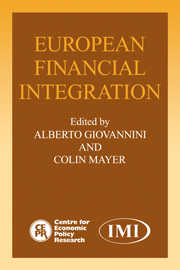Book contents
- Frontmatter
- Contents
- List of figures
- List of tables
- Preface
- List of conference participants
- Foreword
- 1 Introduction
- 2 Banking competition and European integration
- Discussion
- 3 Banking, financial intermediation and corporate finance
- Discussion
- 4 How (not) to integrate the European capital markets
- Discussion
- 5 European financial regulation: a framework for policy analysis
- Discussion
- 6 Corporate mergers in international economic integration
- Discussion
- 7 Capital flight and tax competition: are there viable solutions to both problems?
- Discussion
- 8 Reflections on the fiscal implications of a common currency
- Discussion
- 9 Currency competition and the transition to monetary union: does competition between currencies lead to price level and exchange-rate stability?
- 10 Currency competition and the transition to monetary union: currency competition and the evolution of multi-currency regions
- Discussion of chapters 9 and 10
- 11 Problems of European monetary integration
- Discussion
- Index
7 - Capital flight and tax competition: are there viable solutions to both problems?
Published online by Cambridge University Press: 04 August 2010
- Frontmatter
- Contents
- List of figures
- List of tables
- Preface
- List of conference participants
- Foreword
- 1 Introduction
- 2 Banking competition and European integration
- Discussion
- 3 Banking, financial intermediation and corporate finance
- Discussion
- 4 How (not) to integrate the European capital markets
- Discussion
- 5 European financial regulation: a framework for policy analysis
- Discussion
- 6 Corporate mergers in international economic integration
- Discussion
- 7 Capital flight and tax competition: are there viable solutions to both problems?
- Discussion
- 8 Reflections on the fiscal implications of a common currency
- Discussion
- 9 Currency competition and the transition to monetary union: does competition between currencies lead to price level and exchange-rate stability?
- 10 Currency competition and the transition to monetary union: currency competition and the evolution of multi-currency regions
- Discussion of chapters 9 and 10
- 11 Problems of European monetary integration
- Discussion
- Index
Summary
Introduction
The history of European capital taxation is one of 12 disparate systems, competing for revenue not only with each other but also – and sometimes dramatically – with their own taxpayers. With the imminent arrival of 1992 the fiscal landscape will change significantly: if current capital tax systems are left untouched, European governments are likely to find it very hard to collect revenue from internationally mobile capital. Indeed, Europe may transform itself into a single (large) tax haven.
In this paper we perform an exercise in applied positive economics: we design a model of residence-based corporate taxation that, while preserving national tax sovereignties, minimizes the distortions arising from international capital mobility. This type of exercise is in our view especially useful because in the current debates over tax reform in Europe there is much confusion between administrative problems and political constraints. Analysis of models of taxation like ours can help clarify where administrative issues end and political issues begin.
To motivate our study, we begin in section 2 with a look at the data on revenue from capital income taxes and a brief discussion of the role of the history of capital taxation in shaping the fiscal institutions and private practices that are visible today. After listing in section 3 the (often unintended) distortionary incentives embodied in current tax treatments of international income, we analyse in section 4.1 a plan for a system of corporate income taxation that is consistent with the goal of minimizing the distortions arising from the international mobility of capital. The plan is inspired by the full application of the residence principle of taxation of international capital income.
- Type
- Chapter
- Information
- European Financial Integration , pp. 172 - 210Publisher: Cambridge University PressPrint publication year: 1991
- 6
- Cited by



